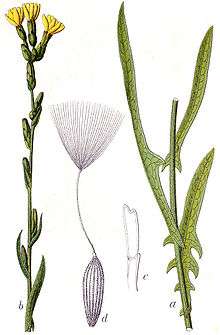Lactuca saligna
| Willowleaf lettuce | |
|---|---|
 | |
| Lactuca saligna by Jacob Sturm, 1796 | |
| Scientific classification | |
| Kingdom: | Plantae |
| (unranked): | Angiosperms |
| (unranked): | Eudicots |
| (unranked): | Asterids |
| Order: | Asterales |
| Family: | Asteraceae |
| Tribe: | Cichorieae |
| Genus: | Lactuca |
| Species: | L. saligna |
| Binomial name | |
| Lactuca saligna L. 1753[1] | |
Lactuca saligna is a species of wild lettuce known by the common name willowleaf lettuce, and least lettuce. It is native to Eurasia but it grows in many other places as an introduced species, including much of North America.[2][3][4]
It can be found rarely in south-east England on dry banks near the sea and estuaries.
Description
Lactuca saligna is an annual herb growing from a taproot to heights between one half and one meter (20-40 inches), and occasionally taller. It is much slenderer than great lettuce Lactuca virosa and prickly lettuce Lactuca serriola. The spindly, mainly erect stem has bristles on its lower portion. The leaves are very long and narrow, up to 15 cm (6 inches) long but rarely than one centimeter (0.4 inches) wide, usually with no lobes and no teeth. The top part of the stem is occupied by a narrow inflorescence. The branches may be pressed against the main stem, that is, or they may branch outward. The flower head is up to about 4 centimeters (1.6 inches) wide when open, with rectangular pale yellow ray florets with toothed tips. There are no disc florets. The fruit is a spiny-ribbed dark brown achene almost a centimeter (0.4 inches) long with a long white pappus(cypselae).[5]
Lactuca saligna flowers from July to August in Britain.[6]
References
- ↑ Carl Linnaeus, Species Plantarum, vol. 2, 796, 1753
- ↑ Altervista Flora Italiana, Lactuca saligna L.
- ↑ Biota of North America Program 2014 county distribution map
- ↑ SEINet, Southwestern Biodiversity, Arizona chapter, Lactuca saligna
- ↑ Flora of North America, Lactuca saligna Linnaeus, 1753.
- ↑ Rose, Francis (1981). The Wild Flower Key. Frederick Warne & Co. pp. 390–391. ISBN 0-7232-2419-6.
External links
| Wikimedia Commons has media related to Lactuca saligna. |
| Wikispecies has information related to: Lactuca saligna |
- Jepson Manual Treatment, University of California
- United States Department of Agriculture Plants Profile
- Calphotos Photo gallery, University of California
- photo of herbarium specimen at Missouri Botanical Garden, collected in Oklahoma in 1989